| Listing 1 - 10 of 116 | << page >> |
Sort by
|
Book
Year: 1999 Publisher: Rockville, Maryland : Agency for Healthcare Research and Quality (US),
Abstract | Keywords | Export | Availability | Bookmark
 Loading...
Loading...Choose an application
- Reference Manager
- EndNote
- RefWorks (Direct export to RefWorks)
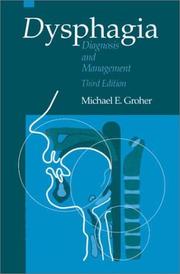
ISBN: 9780750697309 075069730X Year: 1997 Publisher: Boston: Butterworth-Heinemann,
Abstract | Keywords | Export | Availability | Bookmark
 Loading...
Loading...Choose an application
- Reference Manager
- EndNote
- RefWorks (Direct export to RefWorks)
Book
Year: 2018 Publisher: Bruxelles: UCL. Faculté de pharmacie et des sciences biomédicales,
Abstract | Keywords | Export | Availability | Bookmark
 Loading...
Loading...Choose an application
- Reference Manager
- EndNote
- RefWorks (Direct export to RefWorks)
Swallowing disorders are affecting more and more people through the advancement of medicine and the expansion of older populations. In addition, for a number suffering from more severe dysphagia nasogastric feeding is necessary in order to meet their nutritional needs. The administration of drugs to these patients is not a trivial act and requires proper management to avoid any risk associated with it. In order to ensure optimal treatment for patients, a review of the medication should be undertaken by the physician, pharmacist and other health professionals. The only essential drugs are preserved and adapted according to the pathology of the patient. A change in dosage form or replacement with a similar molecule more easily administered is very often possible. When no alternative has been chosen, the use of grinding or opening of the capsules should be checked. If this is allowed, the rules of hygiene and handling must be scrupulously respected. The type of grinder is chosen according to the patient, whether he is at home or in an institution. The drugs administered by nasogastric tube are selected according to several criteria into account the best efficiency and the minimum of toxicity. In order to lower, the risk of complications, rules concerning the medication administration to these patients are to be respected. The pharmacist, the expert in medicines, has an indispensable role of providing prescribing support to the doctor as well as of providing education and advice on drug administration to nurses and other practice staff. Les troubles de la déglutition concernent de plus en plus de personnes suite à l’avancée de la médecine et par l’expansion des populations âgées. De plus, un certain nombre de patients souffrant de dysphagie plus sévère, se voit installer une sonde entérale pour subvenir à leurs besoins nutritionnels. L’administration des médicaments chez ces patients n’est pas un acte anodin et nécessite une prise en charge correcte afin d’éviter tout risque qui y serait lié. Pour garantir un traitement optimal, une revue de la médication doit être entreprise par le médecin, le pharmacien et les autres professionnels de la santé. Les médicaments uniquement indispensables sont conservés et adaptés en fonction de la pathologie du patient. Un changement de forme galénique ou le remplacement par une molécule similaire plus facilement administrable est très souvent possible. Lorsqu’aucune alternative n’a été retenue, le recours au broyage ou à l’ouverture des gélules doit être vérifié. Si celui-ci est autorisé, les règles d’hygiène et de manipulation doivent être scrupuleusement respectées. Le type de broyeur est choisi en fonction du patient, s’il se trouve à domicile ou en institution. Les médicaments administrés par sonde entérale sont choisis en fonction de plusieurs critères prenant en compte la meilleure efficacité et le minimum de toxicité. Des règles concernant l’administration chez ces patients sont à respecter. Le pharmacien, le spécialiste du médicament, a un rôle indispensable de conseil auprès du médecin et, de formation et d’information aux bonnes pratiques d’administration au personnel infirmier.
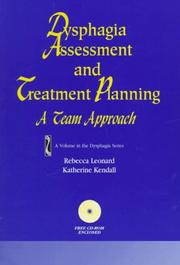
ISBN: 156593749X Year: 1997 Publisher: San Diego (Calif.): Singular publ. group
Abstract | Keywords | Export | Availability | Bookmark
 Loading...
Loading...Choose an application
- Reference Manager
- EndNote
- RefWorks (Direct export to RefWorks)
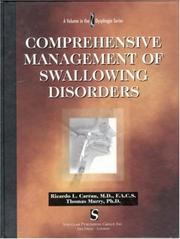
ISBN: 1565939557 Year: 1999 Publisher: San Diego (Calif.): Singular publ. group
Abstract | Keywords | Export | Availability | Bookmark
 Loading...
Loading...Choose an application
- Reference Manager
- EndNote
- RefWorks (Direct export to RefWorks)
Book
Year: 1999 Publisher: Rockville, Maryland : Agency for Healthcare Research and Quality (US),
Abstract | Keywords | Export | Availability | Bookmark
 Loading...
Loading...Choose an application
- Reference Manager
- EndNote
- RefWorks (Direct export to RefWorks)
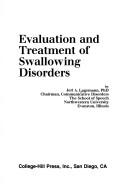
ISBN: 0933014848 Year: 1983 Publisher: San Diego (Calif.): College Hill press
Abstract | Keywords | Export | Availability | Bookmark
 Loading...
Loading...Choose an application
- Reference Manager
- EndNote
- RefWorks (Direct export to RefWorks)
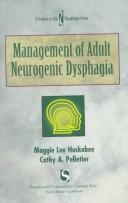
ISBN: 1565937317 Year: 1999 Publisher: San Diego (Calif.): Singular publ. group
Abstract | Keywords | Export | Availability | Bookmark
 Loading...
Loading...Choose an application
- Reference Manager
- EndNote
- RefWorks (Direct export to RefWorks)
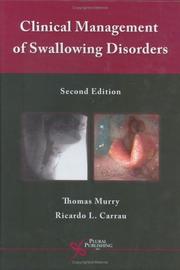
ISBN: 1597560375 Year: 2006 Publisher: San Diego Plural
Abstract | Keywords | Export | Availability | Bookmark
 Loading...
Loading...Choose an application
- Reference Manager
- EndNote
- RefWorks (Direct export to RefWorks)
Book
ISBN: 163550144X 9781635501445 9781635501421 1635501423 Year: 2020 Publisher: San Diego, California : Plural Publishing Inc.,
Abstract | Keywords | Export | Availability | Bookmark
 Loading...
Loading...Choose an application
- Reference Manager
- EndNote
- RefWorks (Direct export to RefWorks)
"Rare Disorders that Cause Dysphagia: A Guide for Speech-Language Pathologists is a resource manual to help medical speech-language pathologists identify the rare disorders that cause dysphagia and offer practical, therapeutic approaches to treatment. Most medical speech-language pathologists are acquainted with common etiologies of dysphagia, such as strokes, head injury, brain tumors, etc. However, there are less common disorders and syndromes that contribute to dysphagia that are not included in most textbooks and reference guides. Consequently, many clinicians who specialize in swallowing disorders are unaware of the impact that most uncommon diseases can have on swallowing. Clearly organized, each chapter is divided into six sections: Definition, History, Etiology, Epidemiology, Clinical Manifestations of Dysphagia, and Management of Dysphagia. Each chapter begins with a list of key terms that are bolded throughout the text and included in a glossary"--
| Listing 1 - 10 of 116 | << page >> |
Sort by
|

 Search
Search Feedback
Feedback About
About Help
Help News
News